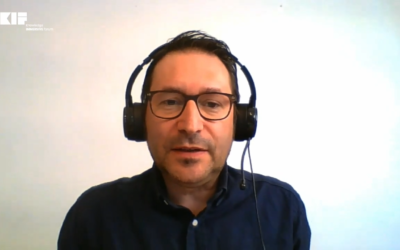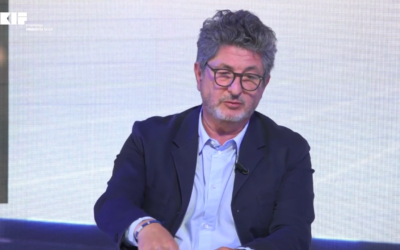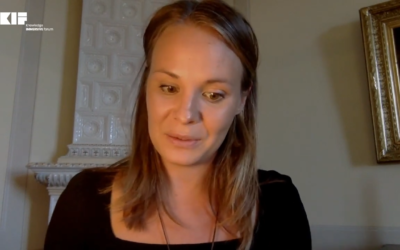Gaspard Giroud : I admire Bertrand, because he’s an absolutely incredible engineer that I met in Los Angeles four years ago, and he had built a headset.
Il avait construit un casque qui était virtual reality and augmented reality, both.
And what happened is that when I saw it, I was very impressed. I was incredible and it was very, very early. He had done it by himself. And then a year later, Apple bought his company, VRvana.
And so he’s a core engineer. He’s the guy who literally built it. So I thought it would be amazing to have him and talk about the headsets.
Alexandre Michelin : Oui, donc dans cette transformation, les étapes du métaverse, il y a effectivement la question des devices, et l’histoire de Bertrand Nepveu est assez exceptionnelle. C’est un vrai geek, un “core engineer”, comme tu as dis, qui a travaillé et développé le casque tout seul, le sien.
Tout le monde se pose la question de ce que va faire Apple. Il n’a pas le droit de dire ce que va faire Apple.
Gaspard Giroud : Il ne mentionne même pas Apple.
Alexandre Michelin : Mais il faut savoir que sa société a été achetée pour plusieurs dizaines de millions de dollars par Apple, assez discrètement. Et il a accepté de parler. On va écouter son interview puis on reviendra dessus avec toi et Rev.
Bertrand Nepveu : Thanks Gaspard for the invitation. My name is Bertrand Nepveu. I’m an engineer and started a company called VRvana in 2005.
Why start a company in 2005 ? Well, I mean, I was a hardcore gamer since, like the ColecoVision and Nintendo and the power level and all that stuff since a very young age. I wanted to be inside the games that I love so much instead of just playing on the screen.
So in 2005, that’s when we started the VRvana adventure. So we went from a VR headset for X-Box up to a mixed reality headset where you can switch from VR to AR on the same device.
Gaspard Giroud : Pour les gens qui s’intéressent à notre industrie, il a commencé très, très, très tôt, juste parce qu’il voulait rentrer dans les jeux vidéo.
Bertrand Nepveu : You’re going to feel like you’re there and not just like through a screen. And one really cool experience that I did lately was… so I used to go physically at Burning Man for the past few years. And of course, because of the pandemic, you know, they canceled it.
But they did an out space VR, a virtual burning man. And it was a really interesting experience for me because I think the first day I just tried it on my computer and I was like : “Oh yeah, I feel like, I see the same things as when I’m there, you know, and it was kind of cool.
But when the next day I tried it in VR, it was a totally different experience because, you know, the art pieces are very big there, but on the screen you don’t really feel the scale.
Gaspard Giroud : Donc ce qu’il dit très, très clairement, c’est la différence entre faire l’expérience de quelque chose en 2D ou en réalité virtuelle.
Alexandre Michelin : Et il mentionne Burning Man.
Bertrand Nepveu : … that’s what makes VR magical. Right now, it’s the only medium that can do that.
So once people experience the value of that, of course, they will always want to do it in VR instead that on the TV screen. But for that, you need more and more people trying it. And I think that we’re seeing the mass adoption of VR right now.
Alexandre Michelin : Donc les grandes étapes pour l’adoption.
Bertrand Nepveu : Convenience needs to be the number 1 thing. I’m an expert in VR and like, if I want to go and try a new game and it’s on Steam, on the PC, like with device… they will work but not seamlessly.
If I haven’t played a game for, I don’t know, a couple weeks and I go and there’s an update and it takes always maybe 30 minutes…
Gaspard Giroud : Voilà donc son premier sujet c’est : “il faut que ce soit facile.” Il ne faut pas qu’il y ait des barrières pour rentrer dans l’espace VR.
Bertrand Nepveu : …and I think I solved that. You know, each time I go back, I put the Quest, it works, you know, it updates automatically…
Alexandre Michelin : On comprend pourquoi Apple l’a racheté. Il a déjà la philosophie…
Bertrand Nepveu : I think that for mass adoption it’s always practice. I think because of Hollywood movies…
Gaspard Giroud : Ça je suis d’accord avec lui, c’est très important. Les gens sont tellement habitués à de la qualité, qualité graphique du cinéma, des effets spéciaux, etc. Et il dit : “c’est ça à quoi les gens sont habitués, donc il faut qu’on arrive là.”
Bertrand Nepveu : If you have someone who is not a geek and who wants to travel or whatever, if you put the headset and it feels not natural, then they might say “oh, all the way.”
So I think now that the mobile part is kind of done, you know, the tracking, the wires all that. I think that, like you said, the graphics need to be maybe two or three times better.
But to get there, you can either like go brute force and just have a bigger GPU. But, I mean, that means maybe three or four years.
But the great thing about a VR headset is that what you’re doing is you’re messing with the brain. You’re trying to fool the brain…
Alexandre Michelin : On essaye de transformer, de manipuler, to “fool the brain”, de retourner.
Bertrand Nepveu : So the more we learn about, and we already know a lot, but the more we learn how the brain process, all those stimulations…
Alexandre Michelin : Et on pense aussi que c’est pas que dans le casque, finalement. Ca fera partie des lunettes… grâce à la 5G.
Bertrand Nepveu : …and that requires a lot of power to do some little brain tricks to reduce the compute and still deliver an amazing graphical experience.
Gaspard Giroud : Alors ça c’est très technique, c’est un peu compliqué. C’est que les casques les plus avancés ne font du réalisme que exactement dans un cône de vision des pupilles, et la zone périphérique autour de ça est calculée en résolution moindre. Le cerveau ne s’en rend pas compte, c’est normal, mais ça permet d’augmenter énormément la qualité.
C’est pour les lunettes. 100% pour les lunettes.
Bertrand Nepveu : …you compute everything in the cloud…
Gaspard Giroud : C’est une solution technique pour pouvoir augmenter nettement la qualité avec la même puissance de calcul.
Bertrand Nepveu : …that are being built that will enable a mass adoption of the metaverse and VR.
Great question. I think that people tend to think that to solve new problems, you need to throw tons of resources on it. And we have a little history about that, is flying, you know. There was a race to do the first planes…
Alexandre Michelin : L’analogie est assez forte. Il compare la course au casque avec la course à l’aviation. Ce n’est pas forcément le maximum de ressources qui gagne.
Gaspard Giroud : Exactement. Et c’est très, très inspirant pour les gens, y compris pour Garou et d’autres associés comme ça, et c’était son cas à lui, il parle d’expérience. C’est-à-dire que ce n’est pas la quantité d’argent… pas que. Pas au début.
Clara Schmelck : En attendant on voit bien qu’il s’agit d’une vraie révolution industrielle.
Bertrand Nepveu : If you go back, it had the best Nvidia graphics on the planet way back in 2005. Now that’s a bit different, but way back like they were pushing for that. So that was kind of like : “OK, now we have like the building blocks to try to do this, but it took us like, to really have something that we could be proud of, you know, it took like, I don’t know, 10 years.
Alexandre Michelin : 10 ans de boulot.
Gaspard Giroud : 10 ans pour être content du premier casque.
Bertrand Nepveu : From 2005 to 2015, you know. It was trial and error and lots of failures, but we were a very small team, we were like four people for so long and almost no salary, so there was no pressure to deliver something.
If you work at a big company like Magic Leap or whatever…
Alexandre Michelin : Il parle des concurrents qui avaient des moyens considérables.
Bertrand Nepveu : As for us, it was like : “OK, we need to find the right technology.” And then it took ten years, but then, when the blocks were there, we grew the team to about a dozen, like top of the line engineer. I found that it’s better to have one really great engineer than five average. You know, they’re not bad, but one really great engineer will decuplate the creativity, how you connect…
It was a bit like you know, when they started Apple, Steve Jobs and Wozniak. You know Wozniak…
Alexandre Michelin : C’est vrai qu’il fait mention à Wozniak, on sent la même vibe.
Bertrand Nepveu : …it’s not all the way like brute force. It is way a clever way to connect. Maybe the chips are not meant for that. VR was a bit like that at the beginning. It was : “let’s take parts, that our first cell phones, that the Wii controler, or whatever, and put them together in a clever way to show the potential and be great.
So I think that was what we did. Great is like take the best parts and put them together in a clever way. But then after that, you know, you need to scale things.
Alexandre Michelin : Le passage à l’échelle, c’est le point-clé. Il ne s’agit pas simplement de faire un truc cool, sympa. Le vrai test c’est quand ça peut grandir.
Gaspard Giroud : Lui il l’a amené jusqu’à ce que ça puisse aller en production de masse. Et ensuite, il est parti chez un gros tech player.
Bertrand Nepveu : …I think now there’s three or four millions of that. So that’s an amazing achievement from Facebook…
Alexandre Michelin : Il est resté plusieurs années chez Apple ?
Gaspard Giroud : Quatre ans, presque quatre ans chez Apple.
Bertrand Nepveu : …you know, I tell them like “buy this”, they try it, they love it. It makes it very simple. But to simplify something great, it takes a lot, a lot of work and engineering. Something that we couldn’t have done as a small team, but at least we showed that it was possible to mix AR and VR in the same headset.
Gaspard Giroud : Ce qui est important, c’est que, effectivement, Bertrand, en 2007, après avoir commencé en 2005, avait créé un casque qui pouvait switcher entre VR et AR.
Et ce qui est fascinant c’est de voir que, comme il disait en fait, ce n’est pas toujours “brute force”, c’est-à-dire ce n’est pas les millions que tu investis dedans, c’est vraiment d’être “clever”.
Magic Leap sont toujours avec 1 milliard plus d’investissements et sont toujours en train de le faire.
Alexandre Michelin : Oui, et lui il dit “to simplify”, pour simplifier quelque chose de complexe, c’est pas forcément la puissance qui gagne. C’est le talent, en fait.
Gaspard Giroud : C’est pour ça que je l’admire énormément.
Alexandre Michelin : On en a aussi parlé pendant tous les jours, il n’y a que le talent qui fait la différence. La technologie peut peut-être l’augmenter, mais c’est que le talent des artistes ou des ingénieurs…
Gaspard Giroud : Jusqu’à un point. Comme il disait, après à partir de cinq, pour le passage à l’échelle…
Clara Schmelck : Il faut une infrastructure.
Présentateur : Alexandre Michelin
Intervenants :
- Clara Schmelck (philosophe, journaliste, prof à Sciences Po Strasbourg)
- Gaspard Giroud (Fondateur et CEO de Garou)
- Rev Labaredian (Vice Président de NVIDIA)
- Bertrand Nepveu (Fondateur de VRvana)




